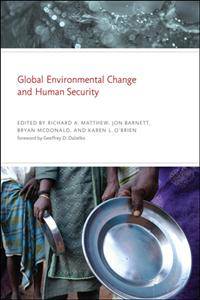In recent years, scholars in international relations and other fields have begun to conceive of security more broadly, moving away from a state-centered concept of national security toward the idea of human security, which emphasizes the individual and human well-being. Viewing global environmental change through the lens of human security connects such problems as melting ice caps and carbon emissions to poverty, vulnerability, equity, and conflict. This book examines the complex social, health, and economic consequences of environmental change across the globe.
In chapters that are both academically rigorous and policy relevant, the book discusses the connections of global environmental change to urban poverty, natural disasters (with a case study of Hurricane Katrina), violent conflict (with a study of the decade-long Nepalese civil war), population, gender, and development. The book makes clear the inadequacy of traditional understandings of security and shows how global environmental change is raising new, unavoidable questions of human insecurity, conflict, cooperation, and sustainable development.







